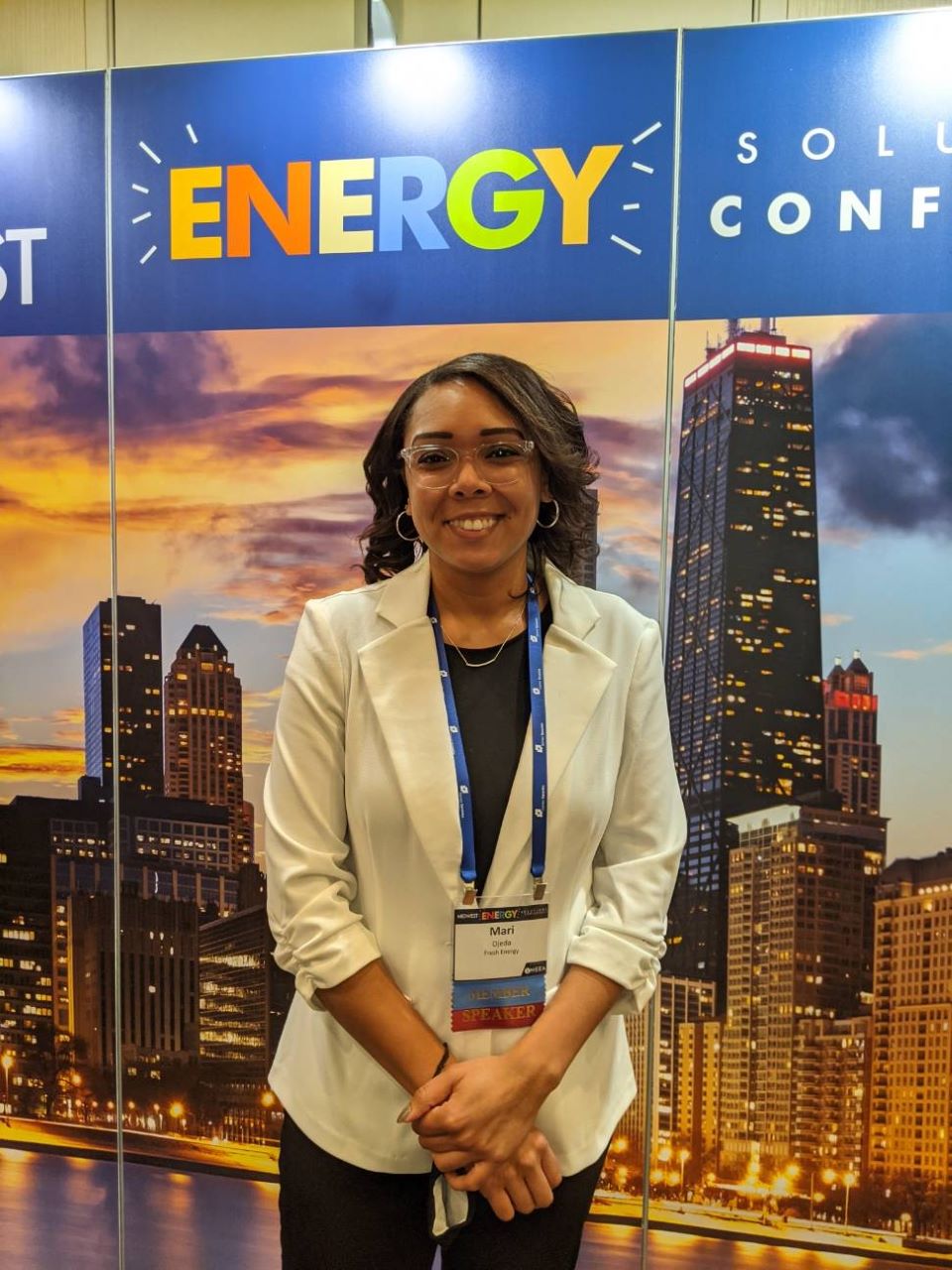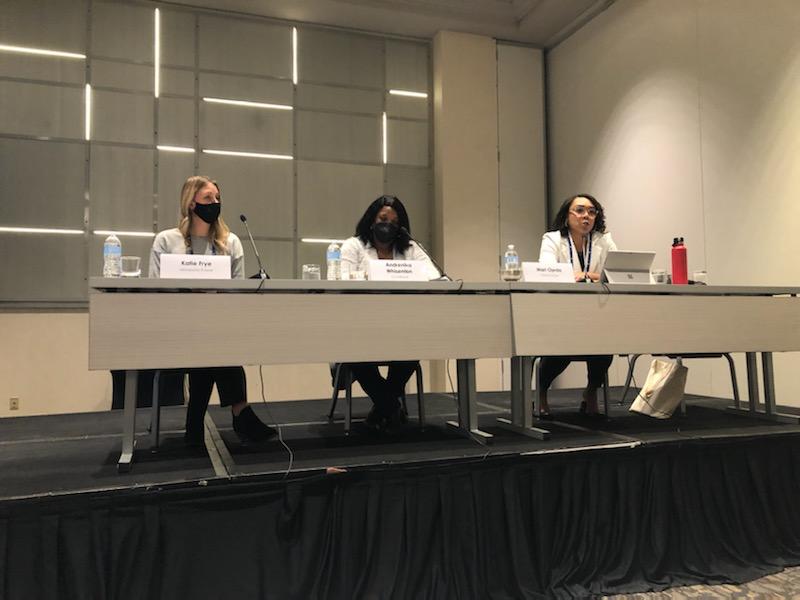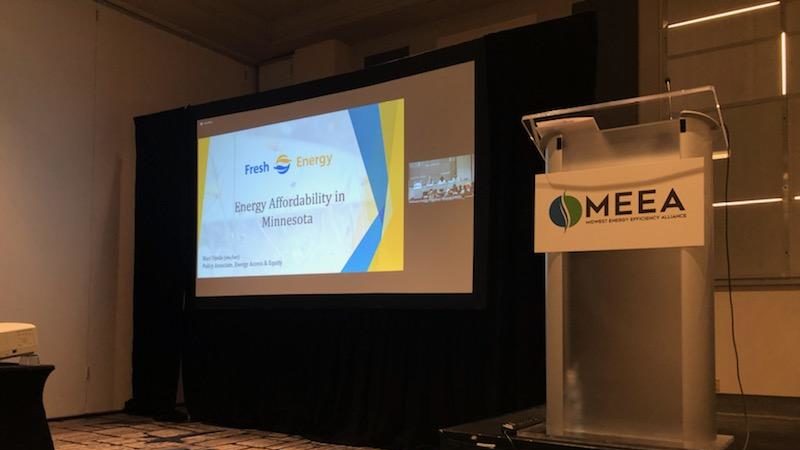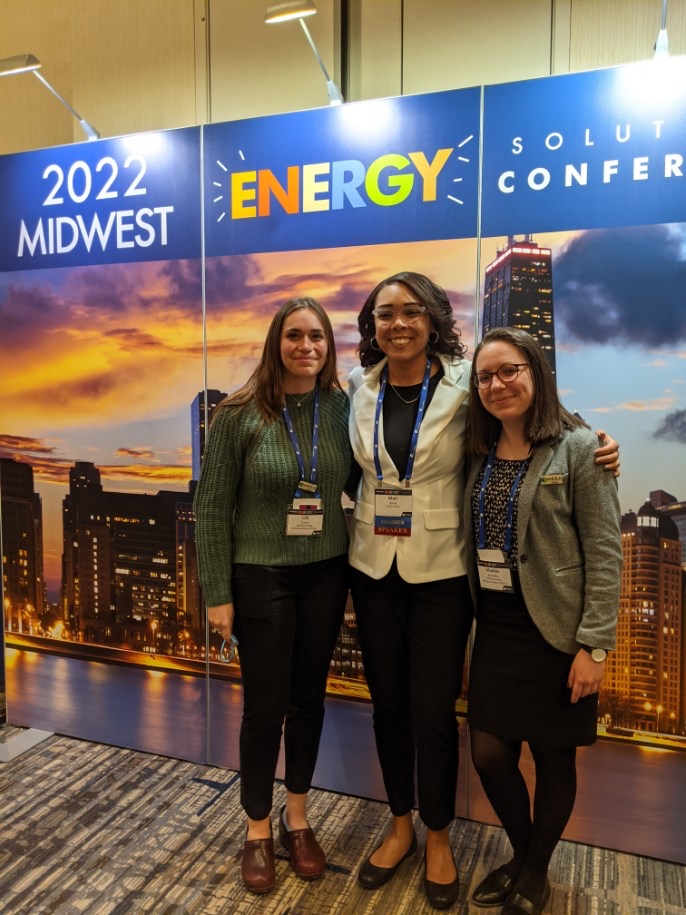
After a few years of hosting virtual events, the Midwest Energy Efficiency Alliance (MEEA) brought its partners back in person—with COVID-19 testing and masks provided!—for the annual Midwest Energy Solutions (MES) conference held in Chicago, Illinois, at the beginning of February. MES convenes people from across the Midwest working in the energy efficiency industry, including advocates, utilities, builders, manufacturers, and service providers. Fresh Energy has been a member of MEEA since 2018 and has participated in many MEEA events over the years. Because so much of Fresh Energy’s work is collaborative, our staff are always looking for opportunities to connect with other advocates and elevate key issues of equity in climate and clean energy.
I was invited to speak on a panel dedicated to addressing barriers to energy affordability and discussing Fresh Energy’s role in advocating for strategies to overcome such barriers, particularly around energy burden in under-resourced households. With my background in policy advocacy, I felt it was also important to discuss efforts to address energy affordability issues holistically, centered around experiences common to people throughout the region.
I was honored to be joined by two co-panelists who are also working to increase energy affordability across the Midwest: Briana DuBose, director of strategic community initiatives at EcoWorks in Detroit, Michigan, and Andrenika Whisenton, partner diversity regional lead at CLEAResult, based in Illinois. Katie Frye, supervisor of customer programs and services at Minnesota Power, moderated the discussion.

First, Briana, who, along with Fresh Energy, is a fellow member of the national Energy Efficiency for All network, laid the foundation of what energy burden—the percentage of gross household income spent on energy costs—looks like, what it means to a resident and particularly a renter, and how it contributes to a person’s overall wellbeing. She discussed the high costs that renters are paying for energy, partly because of reduced access to energy efficiency measures. As Fresh Energy has discussed before, in our recent report, Electrification of Multifamily Housing in Minnesota, the split incentive—a barrier to the deployment of energy efficiency measures in buildings that occurs when those responsible for paying energy bills (the renter) are not the same entity as those making the capital investment decisions (the building owner)—is a major barrier for renters accessing and benefitting from energy efficiency improvements. As we discuss in greater detail in this report, in these circumstances, the building owner may not be inclined to make the necessary upgrades to building services when the benefits associated with the resulting energy savings accrue directly to the renter.
Following Briana’s portion of the panel discussion, I built upon the foundation she laid by highlighting how Fresh Energy advances energy efficiency in under-resourced households. I emphasized that Fresh Energy is dedicated to furthering partnerships with community-based organizations, such as our growing partnership with Community Stabilization Project, as we continue to advocate for renters. I discussed our collaboration with the Minnesota Department of Commerce (the “Department”) and other partners on improving the state’s weatherization program to create better access to funding and improve the overall equity of the program. Fresh Energy is also engaging with the Department on the recently passed Energy Conservation and Optimization (ECO) Act implementation to create guidance for fuel switching, pre-weatherization, and more.

It’s no secret that, as we transition our economy to cleaner and renewable energy, electrification is an essential piece of the puzzle because we’ll need it to accelerate Minnesota and the Midwest’s progress on our climate goals and achieve a carbon-neutral economy. But, how we create our programs and distribute the benefits of electrification matters even more; we must ensure everyone is empowered to make choices that benefit their families and improve the health of our climate.
Lastly, Andrenika closed the panel with action steps for community engagement and outreach, emphasizing the importance of combining data analysis with community input. There is a lot of data out there that can deeply inform decision-making, so Andrenika stressed that matching data with outreach and communication strategies and emphasizing the right message for the right people is critical. She reminded attendees that data is also about people, not just the numbers. As technical subject matter experts who also play a central role in advocacy, it’s crucial that we meet people where they are at and start conversations about these important topics, such as household energy bills.

In addition to my co-panelists, I also engaged with people from organizations similar to Fresh Energy like Brittanie Giroux and Emily Wolfe from Metropolitan Energy Center, who work to reduce greenhouse gas emissions from the building and transportation sectors in the Kansas City region. It was inspiring to meet folks from across the Midwest who are committed to achieving equitable climate solutions in their communities. I’m grateful to have been able to attend the conference on behalf of Fresh Energy to elevate key issues of equity and energy affordability in clean energy and climate, as well as learn about and discuss topics like emerging technologies, financing solutions, program design, cross-sector collaboration (e.g., health and water), workforce development, and grid resiliency. Fresh Energy and our partners and collaborators are engaging on many of these issues at local, regional, and national levels so that we can continue to shape and drive bold policy solutions to achieve equitable carbon-neutral economies here in Minnesota, throughout the Midwest, and beyond.
